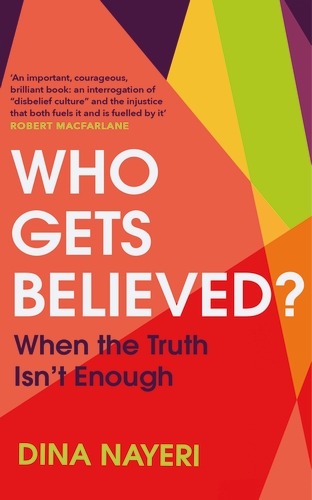Published January 22nd, 2024
Interview
by Viktoriia Medvied
Dina Nayeri is an Iranian-American novelist, essayist, short-story writer, author of two novels and two books of creative nonfiction (Who Gets Believed? 2023, The Ungrateful Refugee 2019), winner of the Geschwister Scholl Preis and a finalist for the Los Angeles Times Book Prize, the Kirkus Prize, Elle Grand Prix des Lectrices, TEDx speaker, currently a lecturer in Creative Writing at the University of St Andrews (Scotland), a wonderful mother, and one of the most inspiring people everybody of her students, colleagues, readers, and friends are lucky to have around. In this interview, she shares a few words about differences in Eastern and Western cultures, mastering English being a non-native speaker, the importance of reading and her own reading habits, who to trust giving your first drafts to proofread, and she also shares ideas on where to find inspiration as well as how to travel writing-wise properly in order to be truly immersed in a newly visited place, a complete necessity for any aspiring novelist.
The text was recorded from a conversation by Vic Medvied
Dina Nayeri’s nonfiction book, The Ungrateful Refugee, is based on real events. At the age of eight, she had to flee Iran along with her mother and her brother in search of safety and peace. On its pages, she dissects a set of real human stories of what it is like to be forced to leave your home for good, and how to be brave enough not only to begin a journey across borders to start afresh but also to make your inner voice sound in English. That is why it seemed to be a good idea to start our conversation with the question of how to learn English and to make this linguistic journey real fun.
Viktoriia Medvied: What is the best way to learn English creatively?
Dina Nayeri: I came to the US aged ten. It’s hard to learn the language at ten, but it’s not impossible to learn it natively. It’s funny how quickly children pick up a language, even things like idioms and accents. I’ve been in Scotland for a year and my daughter has already picked up the Scottish accent perfectly, she can switch in and out of it. She knows all of the Scottish turns of phrase versus the English ones. She has an ear for these things that is so well-developed! And I realized that she is a child. Children have an ear for this and I had that as a starting point for myself.
As I said in the book (Who Gets Believed?), I read a lot. I went to the library and read an unbelievable amount of books. I think reading is a creative act because you have to turn on your imagination. And you have to put yourself in the story. And there are so many little ways that you learn things. You don’t just learn the language. You also learn the nuances of the unspoken part of the language. The culture. How much are they willing to say and not say, some of the metaphors, some of the ways that people communicate. Using language is not just about grammar.
Even as a child, I would write. I would give my writings to other people to read, and they would correct my mistakes, and that is how I learned. The interesting thing is that even in those drafts there was still bad grammar and bad English. I was working out the creative stuff, too. Things like my creative voice and how to build a plot, I was learning them at the same time as I was learning English. You don’t have to learn one before the other.
-dina-nayeri.jpg)
Viktoriia: When you switched to English, did you start feeling like a different person speaking English? A lot of people say that there’s something interesting about English: when you switch from your native language, you feel like a different person, it gives you this opportunity to wear this mask, to pretend to be somebody that you are not. How did it influence your personality in general?
Dina: For sure! I wondered about that. This is a very complicated question you could spend years answering. But I do remember that there was an element of shame because of my accent. And there was this feeling that I was faking it. I would hear the way that Americans would say things, and I would try to copy it to sound more American. But I always felt like I was faking it a little bit. Another thing that I remember is that I would look at myself in the mirror when I talked, and so as a result my self-image in English was different from my self-image in Farsi, because in Farsi it all came naturally. I thought of myself as very beautiful and elegant. But when I looked at myself in the mirror talking in English, I noticed all my imperfections. In English I just imagined myself as more clumsy and less smooth and graceful and elegant than I did in Farsi.
Now it’s the very opposite. I’m very inelegant in Farsi. I love the English language and I love its words, so I just kept pursuing it.
Viktoriia: How do you become a person who gets heard? How to make people believe in your writing in English?
Dina: I think one of the things that I talk about in the book is the importance of developing real expertise. The book is about faking it and this mask people put on, and how we use shortcuts to believe other people. If something looks familiar, we think it’s believable. If a story is familiar, we find it believable. But shortcuts are no replacement for actual expertise. The real, and most reliable way to be believed in the long run, is to just become good at something. So, for people to believe me in the English language and in storytelling means that I need to become better at these things. And to become so good at it that it’s unquestionable. So, that’s the answer. But in the short term, I suppose, I have learned the Western storytelling shortcuts, and these are the narrative rules that are embedded in the psyche of the Western listeners. The things that make them think: “Oh, this is the truth.” And you can write an entire book about them.
Viktoriia: You read a lot. You have a gigantic library at home. What is your reading and writing routine like? Do you replace writing with reading when you don’t feel like creating a story? Can you say that reading is a passive form of writing?
Dina: I think it uses the same part of your imagination or the kind of parts that are in conversation with writing, so I guess it’s a good way to trigger the imagination. It doesn’t satisfy me in the way that writing does. And in fact, every time I’m reading, what I love about it is that it triggers ideas for my own writing, so I’m always itching to get back. It’s almost like when you eat a very delicious dish that has a little bit of sugar in it, and suddenly you want to put that down and move on to a dessert. That’s how it is for me — a little bit of a taste that makes me want to write. But in terms of my reading routine, unfortunately, it has been kind of in-between things, for example, every time I’m on trains, or I wake up in the morning and I’m having my coffee. Kind of in-between the cracks of a day. I keep many books around and I don’t necessarily finish one before I start another, I have several going simultaneously.
I read the most when I can’t write and I need someone else’s words, someone else’s voice to just relax and learn from. Reading really calms down the anxieties of being a writer and the nerves that you have about your career. You realize how big the world is, how many kinds of writers there are, and how joyful it is to read other people’s work and to make time for their words. If you don’t read other people’s work, you drown in this feeling of being alone in your little bubble with nothing but your own thoughts. And then you start to feel jealous, “Why did she win this big prize?” But if you read her work, you’d be like “Oh, that’s why she won that big prize. Because she is really really good.” It combats the feeling when this trollish and terrible part of you comes out, it calms it down. In general, reading makes you more of a humane and gracious person, it makes you really realize what an incredible world of words we live in.
Writers who don’t read a lot don’t admit that other people’s writing can give them inspiration. If I read a book about a particular place or time, it’s not like I would want to write about this place or time, or it’s not like I suddenly get inspiration or need to write exactly in that voice. The inspiration happens indirectly. It’s like seeing something unfold in a particular way that you thought couldn’t be done before. You are then inspired because that person had an idea and they made it happen. And so maybe this other idea you’ve had you can make happen!

Viktoriia: Reading and New Year’s resolutions. Do you have an exact, so-called perfect number of books you need to finish throughout 365 days? Some people set a goal of 30 books they need to complete reading per year, others set their bar higher and say the aim should be 50 or even more. Do you do anything like that?
Dina: I had the resolution to read 30 books in a year. That’s the number everyone picks. They think that’s a respectable amount. But let’s face it: I’m not going to read 30 books. Unless you count all of the Ph.D. books that are not published, and the ones that come through, which I guess I should count. To read 30 books one has to be a lot more diligent and dedicated than I am. And I don’t know how you can do it and still be a parent and a writer. And, on top of that, being as addicted to my phone the way that I am. But I will read 20.
Viktoriia: What is your favourite book and what is the last book that you read?
Dina: My favourite book? That is a hard question because there are a lot of great books that I love. The last book that truly impressed me is called When We Cease to Understand the World by Benjamin Labatut. It’s amazing. Right now, I’m reading several books:
• In by Will McPhail. It’s a graphic novel that is so very moving, and I had never been this moved by a graphic novel in my entire life.
• Outpost by Dan Richards, which is a gorgeously written travel book.
• The Incendiaries by R.O. Kwon.
• To Rise Again at a Decent Hour by Joshua Ferris, which I am really enjoying. It’s about this dentist, incredibly wonderfully neurotic, I really relate to that character.
• The Land of Green Plums by Herta Müller and Too Loud a Solitude by Bohumil Hrabal, which one of my students gave me before Christmas.
I’ve started all of these books and I am reading them at once.
Nationality: Ukrainian
First Language(s): Ukrainian
Second Language(s):
English,
Russian
Supported by:


